“Work is just work…right?”
For those uninitiated, here’s the simplest way to describe the nuanced brilliance that is the Emmy-nominated Apple+ Series Severance:
Severance is Office Space meets 2001: A Space Odyssey meets…The Shining.
It’s clearly a risky concept, hence why it probably took creator Dan Erickson and executive producer/director Ben Stiller years to receive a green light, but in hindsight it’s obviously a gamble that is paying off judging by the 14 Emmy nominations for its first season. If Severance continues to consistently be this engaging, riveting, and mind-bending with its original story & crisp writing, its on-point performances – and most importantly its crawl-into-your-brain-and-live-there-while-you-sleep tone – upon the series’ completion Severance will be in the same conversation as Breaking Bad. Yeah, I said it. (Bookmark it.)
This, however, is where my Severance review both begins and ends. Because anyone who’s already seen the show knows how mind-blowing it is.
I’m not here to write about how brilliant Severance is.
I’m here to write about how terrifying Severance is.
And I’m not talking about terrifying like jump scares, hallucinations, and bizarro dance sequences set to “defiant jazz.“ I’m talking terrifying like Severance belongs in the documentary category instead of psychological thriller.
Many have already written about how Severance is one possible version of a dystopian workplace future.
I’m here to argue that Severance is not only a dystopian portrait of our future…in many ways we’re already there.
First Things First…What Is ‘Severance?’
For those not already familiar, the series Severance is based upon the medical procedure of the same name whereby a person undergoes an elective brain operation that severs their “personal self” from their “work self.” It’s the very literal version of work-life balance whereby your “Outie” (the technical term as coined in the series) has no memories of what is happening at work, and your “Innie” begins as a blank slate with no previous memories (or original ideas of its own) and has no clue if outside of the office they have a family, hobbies, or any life whatsoever.
Simply step into the elevator, close the doors to the outside world, and say goodbye to the other half of your life.
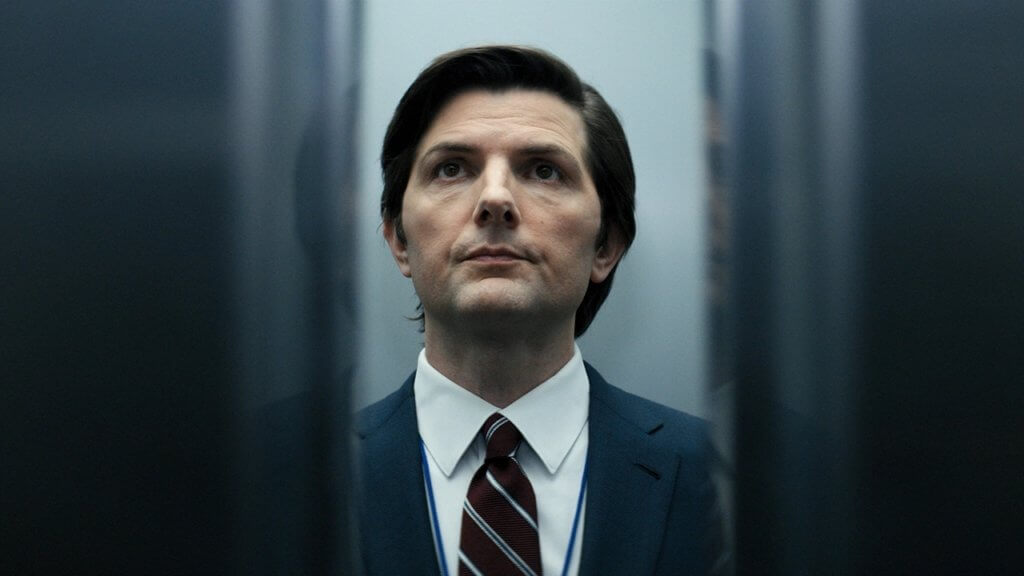
Upon electing the procedure, all patients must recite the following:
“I have of my own free accord elected to undergo the procedure colloquially known as Severance. I give consent for my perceptual chronologies to be surgically split, separating my memories between my work life and my personal life. I acknowledge that henceforth my access to my memories will be spatially dictated. I am aware that this alteration is comprehensive and irreversible. I make these statements freely.”
So why in the world would someone voluntarily elect to undergo severance?
Not one but two supporting characters asked this exact question of the title character Mark (played brilliantly by Emmy-nominee Adam Scott) who chose to have the surgery after losing his wife in a car accident.
“Did you ever think that maybe the best way to deal with a fucked up situation in life isn’t just to shut your brain off half the time?”
and…
“You could get married and have kids and forget they exist for eight hours every day for your whole life. It doesn’t mess with your head?”
As Mark responds…
“I think for some people that’s the point.”
For those already arguing this medical procedure doesn’t exist, you are correct. But we’re a lot closer to literal “severance” than you might think.
If your counter argument is that Severance could not conceivably become our reality because it’s “just a show,” imagine thinking upon its initial release the extreme level of violence in A Clockwork Orange could never become everyday reality (have you watched the news lately?), or that a film like Idiocracy only serves as absurdist comedy (as opposed to being a documentary spanning the years 2016-Present), or…well…three words:
A Handmaid’s Tale.
All I’m saying is be careful thinking a show like Severance is simply mindless (pun intended) entertainment.
My argument is not that we can literally undergo the same neurological procedure as depicted in the show (yet). My argument is that in many ways we’re already severed without needing any procedure at all. And “Quiet quitting” barely scratches the surface of what we’re doing to escape the misery of our work.
We Already Define Ourselves By Our Jobs
“Who are you?”
From literally the very first line of dialog spoken at the opening of the series, it’s clear the theme of the show will be personal identity.
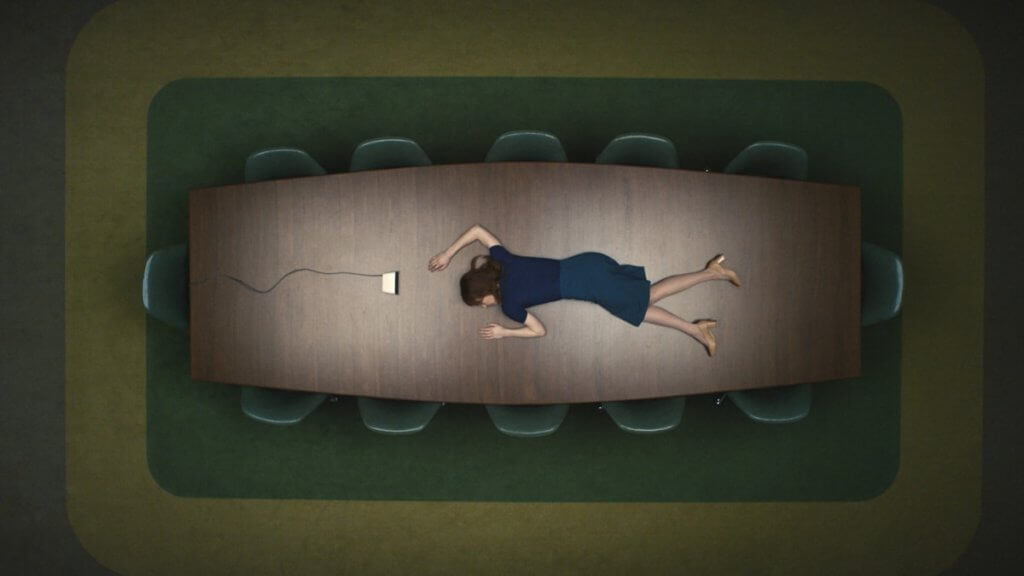
Upon waking up in a bland, lifeless, and non-descript conference room (think: Kubrick’s take on Mad Men), it’s clear we’ve been thrust directly into the point-of-view of the newest addition to Lumon Industries, Helly R (played by Britt Lower). Having just been severed, she has no memory of who she is or how she got there. Her mind is essentially a blank slate.
So how does this relate to our present workday given none of us have ever woken up in a conference room with no clue how we got there? (except for maybe the next morning after that one holiday party?)
Picture the last time you went to a live networking event, an industry panel, or a mixer. What’s the same first question that everybody asks ad nauseum over and over and over (and over) to begin the conversation?
So…what do you do?
We literally define our first impression of others by what they do. We would never begin a conversation with “Tell me about yourself”, “What do you believe in?”, or even something as simple as “What are you interested in?” because we no longer know how to talk about our lives outside of work (mostly because we don’t have any).
Furthermore it’s not just that we find it easy to define others by the work they do, it’s also how we define ourselves. In my Optimizer coaching & mentorship program I’ve workshopped countless creative résumés, biography paragraphs for LinkedIn, and “About” pages on portfolio websites that begin with:
My job as a [insert title here] isn’t just what I do for a living…it’s who I am.
Stop!!! We are not our jobs, and we should not define ourselves by the work we do.
Let me say this again.
WE. ARE. NOT. OUR. JOBS.
Yes our work should fulfill us, yes we should dedicate large amounts of our focus & energy to our craft, and yes we should be proud of our contributions to society, but ultimately our lives will likely be filled with regret if upon our deathbeds our only contribution to society was based on our level of productivity. While I don’t believe “Quiet quitting” is the answer, there has to be a middle ground.
As stated in my podcast interview with best-selling author Greg McKeown:
“Nobody asks to have the following etched onto their tombstone:
They checked e-mail.”
Unfortunately when our identity is tied to our jobs, the quality of our mental & physical health is dependent on how well things are going at work. And when things aren’t going well (e.g. how much did you really relax the last time you were unemployed?), we’ll do anything to escape the drudgery of our existence.
We Already Take Extreme Measures to Separate Work & Life
“Every time you find yourself here, it’s because you chose to come back.”
Once a new Lumon employee has overcome the sheer terror of waking up in a conference room with no memories or identity, they are then further onboarded into their respective department by watching a video of themselves voluntarily agreeing to be severed.
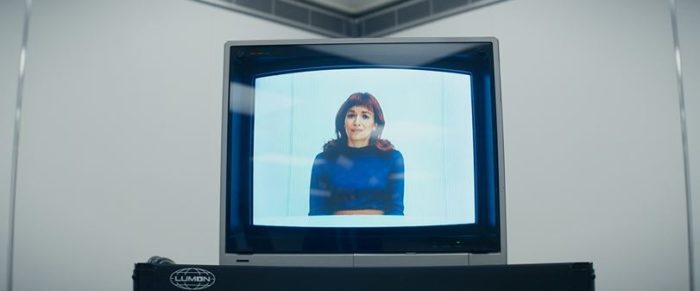
Helly R’s “outtie” explaining to her “innie” why she chose to undergo severance.
It’s made abundantly clear to every Lumon “Innie” during their first day that their severance procedure was the voluntary choice of their “Outtie.” Despite not understanding how they got there, they are left holding the emotional weight of accepting that they themselves erected the freshly minted prison walls surrounding them (in the form of cubicle separators) by choice.
At this point they have two options:
- Accept “this is just how it is” and become part of the machine
- Do everything humanly possible to drown out the guilt and shame of allowing themselves to become a prisoner in someone else’s dream
No different than the severed workers at Lumon, we too as a society have found countless ways to sever our work lives from our home lives. Whether it’s drugs, alcohol, porn, food, or any other number of unhealthy addictions, we do everything we can to minimize and drown out the voices in our heads screaming:
“I can’t live like this anymore!”
“These hours aren’t sustainable!”
“The money isn’t worth it if you miss your kids growing up!”
“How did I let myself get here!”
“I hate what I do…but I have no other options.”
So instead of listening to our intuition or facing the screaming voices in our heads, we instead settle back with Netflix for “just one more episode” at 1am while we drink ourselves to death because nothing ever changes. Or even worse our addiction of choice ultimately (and ironically) becomes the work itself. So to drown out the voices even further…we just do more work.
How many times have you had the following conversation with a co-worker?
“Hey, it’s really late. You should head out. See your kids, get some sleep.”
“Nah, all good. I’m gonna keep plugging away. Big deadline tomorrow.”
And you walk away having that sinking suspicion that no matter how bad things might be at the office, things are clearly even worse for this person at home (most likely because of work).
This, my friends, is our present version of severance.
And here’s the most terrifying part of all: Our inability to balance work & life is not a flaw in a broken system…it’s a feature.
We Already Accept Unreasonable Amounts of Workplace Exploitation and Abuse as “Normal”
“The surest way to tame a prisoner is to let him believe he’s free.”
After only a few days in the office Helly R may not understand yet how she ended up in the bowels of Lumon, but Mark S (Adam Scott) has been there for over a year and has adjusted to being an inconsequential widget in a much larger machine. And by “adjusted” I mean he has become subservient to the exploitation and abuse that Lumon dishes out on an hourly basis.
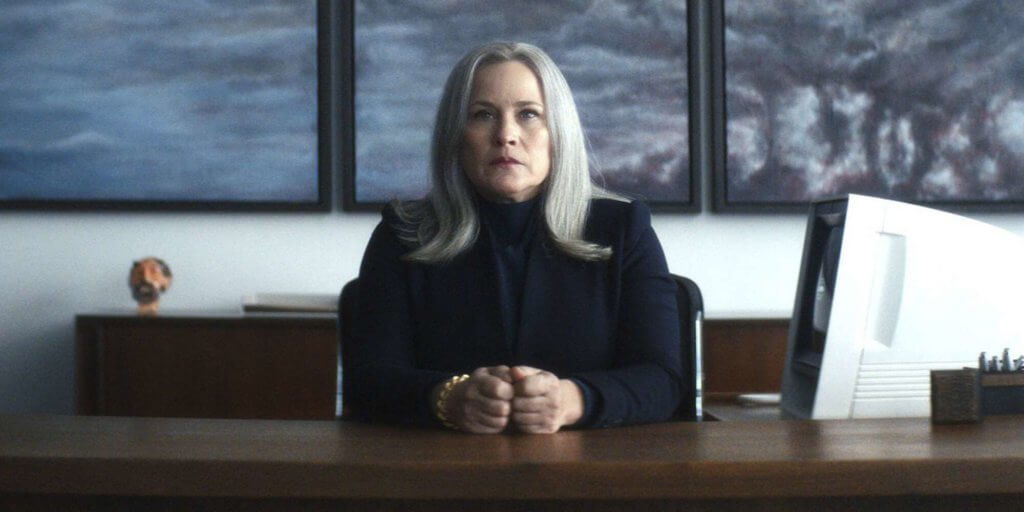
There is one poignant scene where Mark’s boss (played by Emmy nominee Patricia Arquette) throws a coffee mug at his head in an outburst of rage and then has the audacity to frame the abuse as a teachable moment.
“What I just did was something I knew you could handle and grow from. It was very painful for me. I hope that you’ll let it help you.”
Mark’s offense? He didn’t fill out a “common space reservation slip” to take his new team member Helly R to “The Perpetuity Wing.” (Severance takes TPS Reports to a whole new level.) This passive-aggressive form of manipulation leadership is just one of many ways the management team at Lumon controls their workers.
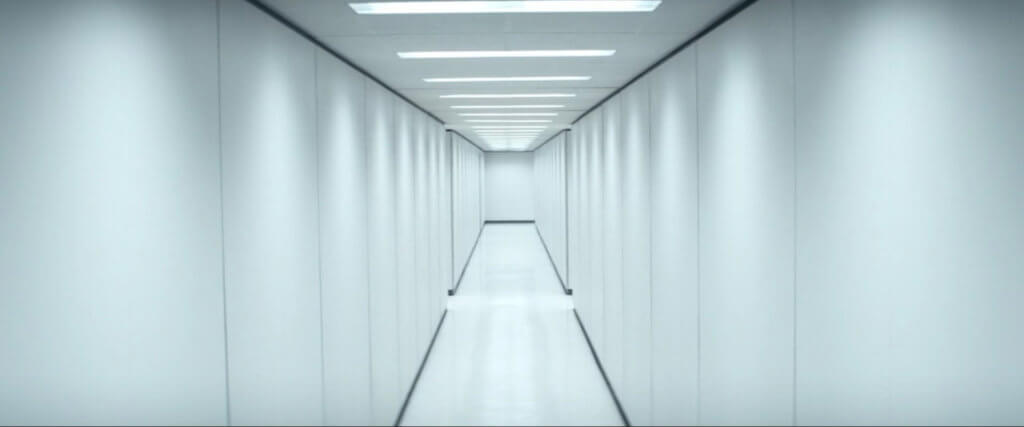
Just one of the many endless (and windowless) hallways in the labyrinth that is Lumon.
Whether it’s designing an office space plan akin to casinos & underground labyrinths whereby Lumon employees lose all sense of time and space (not to mention any external reminder the outside world even exists),
…Or having countless arbitrary policies in the “Compliance Handbook,” one example being they don’t allow workers to doze off even for a moment (for fear of the subconscious reconnecting the Innies to their Outties),
…Or being locked into your cubicle area to prevent fraternizing with other departments, which as department manager Milchick (played by Tramell Tillman) explains with an eerie smile, “I prefer the term safely situated.”
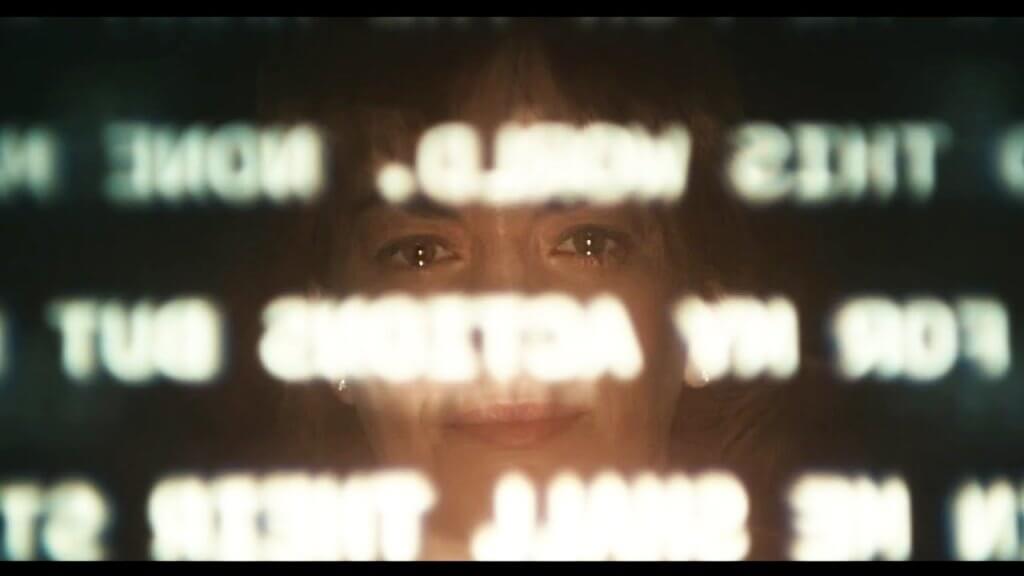
…And don’t even get me started on ‘The Break Room’ and its involuntary indoctrination of corporate culture…
It’s clear that Lumon has anything but the well-being of their workers in mind.
Even worse than the obvious abuses listed above, the more egregious abuses are the dangling carrots disguised as incentives to maintain community, fulfillment, and loyalty.
Whether it’s chinese finger traps, melon & “defiant jazz” dance parties, the bizarro experience that is a “wellness session,” or the end-of-quarter waffle party (which is essentially a scene straight out of Eyes Wide Shut minus the boobs), it’s painfully obvious the tactics Lumon uses to keep workers towing the line to maintain maximum levels of productivity are no different than the passive-aggressive manipulation, empty praise, and sense of false loyalty we presently endure from countless studios & corporations.
“Sorry, we don’t have the budget for overtime. But we have free pizza. And this will look great in your portfolio!”
“Thanks so much for achieving this miracle! Now that you’ve done it once…do it every single day but with less time and less money. Thaa-anks!”
“When this project is over there are definitely plenty more projects coming down the line with better budgets. We’ll totally keep you in mind.”
I’ve already written extensively about how even before the pandemic “normal” wasn’t working and how none of us wanted to return to the way we did business in “the before times.”
Unfortunately every dire prediction I made in that mid-2020 article has come true, and we can now only dream of things being as good as they were pre-pandemic. Don’t believe me? Spend just five minutes scrolling through the endless horror stories about the toxic workplace abuses in Hollywood in the @IA_Stories Instagram Account.
The only thing more horrifying than the amount of workplace exploitation we deem “normal” nowadays is the fact that we will sacrifice anything to provide maximum value to the system that’s destroying all of us.
We Already Worship Productivity Above Our Own Lives
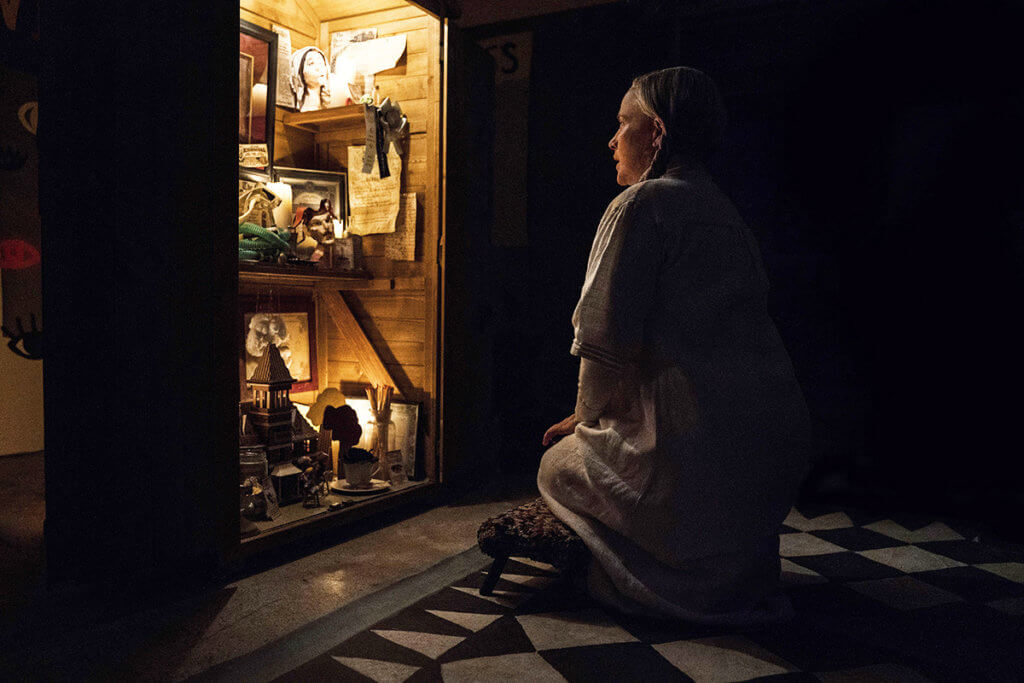
Cobel literally worshipping Kier, the founder of Lumon Corp.
Despite his best efforts, his reciting of core Lumon principles, or his incessant micromanaging, Mark simply cannot convince Helly R to tow the line and become one of them. After numerous attempts to escape, after trying to pass messages to her Outtie, and after receiving a message from her Outtie in return saying:
“I am a person, you are not. I make the decisions, you do not.”
Helly R decides the only way to “reintegrate” (i.e. un-sever) and escape the living hell that is her job is via suicide.
Shortly after, Mark finds Helly R in the elevator dangling from a surge protector fashioned as a makeshift noose, and he rushes in to save her. Security then frantically appears screaming “Get in the elevator!” knowing that Mark will immediately transform from “Innie” to “Outtie” upon arrival at Lumon’s ground floor. When he exits the elevator he has absolutely no idea what just transpired moments ago, and he is very kindly greeted by the night security manager saying, “Mr. Scott, have a good evening,” in which Mark simply replies “Same to you.”
Upon Mark’s return to the office the next morning (which to his brain is just moments later), he finds both his boss and direct supervisor waiting for him. His first question is, “Is she alive?” And they respond by sitting him down as if the whole suicide attempt was his fault, mentioning she will be back at her desk in a few days, and concluding with:
“Have a productive day.”
This is about as in-your-face a reminder as we can get that we are all replaceable in 24 hours or less. We are valued as long as we are productive. Once we are no longer productive, we become expendable widgets.
If you died tonight, your employer would have a job advert to fill your role by the end of the month. But your friends and family would miss you forever. Don’t get so busy on making a living that you forget to work on making a life 👍🏻
— Michael (@trellymick) October 18, 2018
Productivity in our culture has achieved cult-like status. At the tap of a screen we have instant access to literally millions of to-do list apps, project management systems, and all the latest tech to make our lives easier. So then why is everything just getting even more impossible? Our newfound belief that productivity is simply about working smarter (instead of harder) only gets us so far without also having clear boundaries in our lives to use the extra time we’ve created for good (instead of just for more work).
If being productive actually led to more sleep, more quality time with our kids, and the time we can never “find” to exercise, I’d be all for maximizing productivity!
Yet instead of parlaying our ability to work smarter into time for activities that allow us to recover and reenergize, we instead use the time we saved to instead deliver the next miracle for our overlords. Our ambition does not earn us a promotion or any meaningful recognition, but in fact, it backfires and turns today’s miracle into tomorrow’s expectation. Cue the endless the need for “quiet quitting” to have some semblance of guardrails protecting us from workplace exploitation.
But again, maximizing productivity at the expense of our well-being is not a flaw in the system. It IS the system.
Until we all collectively decide that we are no longer expendable.
So…How Do We “Reintegrate?” (i.e. Un-Sever)
“You think you need your job…but your job needs you.”
While it’s yet to be seen at the end of season 1 what those at Lumon can do to un-sever themselves, for us I believe the solution is much clearer. There is only one way we change the system and that is by all of us collectively agreeing the way we work is no longer acceptable. As long as we are replaceable by those willing to endure the exploitation and abuse that we are not, the cycle will continue. But ultimately, without us the work simply doesn’t get done.
Without boundaries we aimlessly travel the road towards burnout.
Without boundaries we work so many nights in a row we end up falling asleep behind the wheel on the way home (and for some that becomes their last night on earth).
And without boundaries our careers are cut years (or even decades) short because we become jaded, cynical, and no longer have any energy or creative passion to do the job we once had so much passion for.
Reversing this cycle is not going to be easy, but the solution is very simple.
Instead of saying yes…we simply say no.
If you’ve hit a wall where you can no longer meet the impossible expectations of your job, and you’re concerned you might be headed towards burnout (or already there), I suggest reading about The 7 Red Flags That You Might Be Burned Out.
Already convinced you’re burned out and severance is the only viable solution left? Here are So You’re Burned Out…Now What? [7 Ways to Climb Out of the Hole].
And then after reading both of these articles, go watch Severance!

